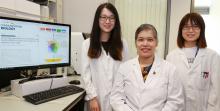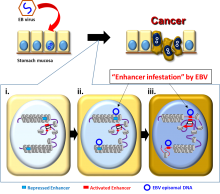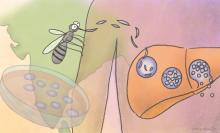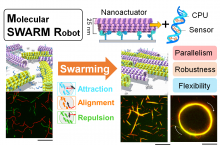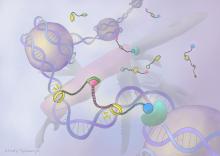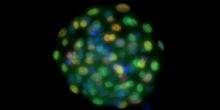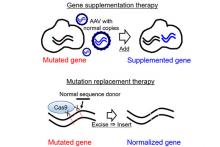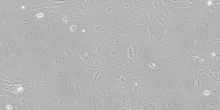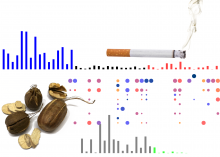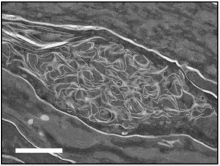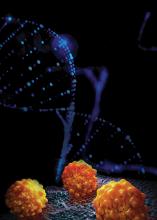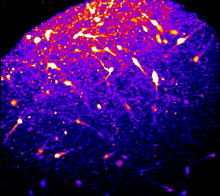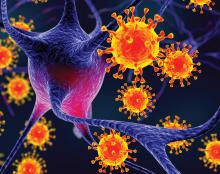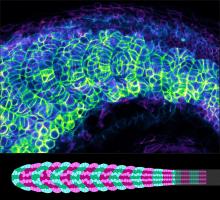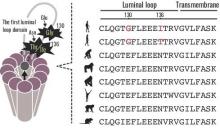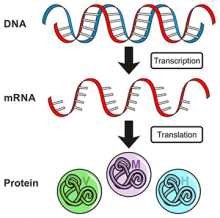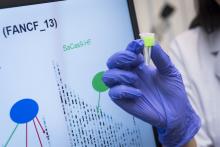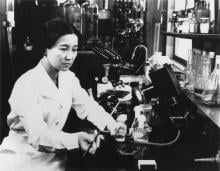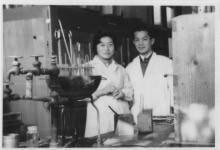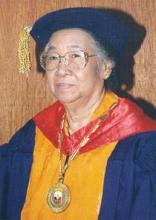Genetics
News
04 Aug 2020
Prognosis describes how serious a patient’s cancer is and his or her chance of survival. A genetic biomarker is a clinically useful tool to help estimate the state of the disease. A study, conducted by the Faculty of Medicine at The Chinese University of Hong Kong (CU Medicine), has identified a gene called GPR18 which can be a biomarker to help form the prognosis for a patient in nine cancer types. The research team has also provided new insights into B-cells for a cancer patient’s prognosis. The findings were recently published in the international scientific journal Communications Biology - Nature.
27 Jul 2020
Epstein-Barr virus rewires host epigenome to turn on latent genetic enhancers that activate proto-oncogenes, leading to tumorigenesis in stomach cancer
02 Jul 2020
A method that involves infecting liver cells with mosquito-bred parasites could improve the study of malaria in India.
18 Jun 2020
Scientists are looking for ways to make millions of molecule-sized robots swarm together so they can perform multiple tasks simultaneously.
03 Jun 2020
A highly accurate machine learning tool could help doctors tailor individualized treatments for people with glioma brain tumours.

25 Mar 2020
Singapore's National Supercomputing Centre fast track access for researchers involved in COVID-19 research. Applications are open from now until 23 September 2020.
28 Feb 2020
A new compound with the potential to turn genes on and off could lead to new cancer and hereditary disease treatment strategies.
14 Feb 2020
DGIST Professor Cheil Moon’s research team identified the molecular mechanism of innate olfactory behaviors. Clarified sensory defect accompanying neurodevelopmental disorder and cancer; will contribute to early diagnosis and improving anti-cancer drug side effects
07 Feb 2020
A calf was born from an embryo lacking cells which form a large part of the placenta, providing new insight into the regenerative capacity of mammalian embryos.
07 Feb 2020
Researchers at Kanazawa University report in the Journal of Thoracic Oncology a promising novel approach for a combined treatment of the most common type of lung cancer and associated secondary cancers in the central nervous system. The approach lies in combining two cancer drugs, with one compensating for a resistance side effect of the other.
07 Feb 2020
Mice born blind have shown significant improvement in vision after undergoing a new gene therapy developed by a team of Japanese scientists.
07 Feb 2020
Scientists suggest a new strategy that uses induced pluripotent stem cells (iPSCs) to regulate immune reaction to transplanted tissues.
06 Feb 2020
A global research collaboration, led by world class institutions in Singapore, the UK and the USA, has developed the most detailed catalogue of mutational fingerprints found in most types of cancers that could help clarify their developmental history and lead to new prevention and treatment strategies.
29 Jan 2020
Hokkaido University scientists are getting closer to understanding how a rare hereditary disease impairs the skin’s barrier function, which determines how well the skin is protected.
24 Jan 2020
Testing for a gene expression pattern could reduce the number of colorectal cancer patients referred for unnecessary radical surgery.
15 Jan 2020
First-of-its-kind study led by Duke-NUS Medical School and National Neuroscience Institute (NNI) applies experimental methodology using human neural cells and brain organoids to investigate mechanism underlying epileptic seizures in Angelman syndrome, an autism spectrum disorder.
13 Jan 2020
Analysis of the Nomura’s jellyfish genome has identified unique genetic adaptations that helped them become early, successful multi-cellular predators.
13 Jan 2020
A hyperactive gene response to Japanese encephalitis virus infection ultimately leads to brain inflammation.
23 Dec 2019
Professor Dennis Yuk Ming LO and Professor Rossa Wai Kwun CHIU from the Faculty of Medicine at The Chinese University of Hong Kong (CUHK) have been named the “Top 20 Translational Researchers of 2018” by the world-renowned scientific journal Nature Biotechnology. They are the only Hong Kong scientists on the list and it is the third consecutive year for Professor Lo to receive this honour.
23 Dec 2019
NUS researchers found that chevron patterns in fish swimming muscles require physical forces to correctly develop, not only from genetic instruction or biochemical pathways.
23 Dec 2019
Researchers revealed the evolutionary changes in neurotransmitter uptake of VMAT1 by reconstructing ancestral VMAT1 proteins.
17 Dec 2019
A team of researchers from the National University of Singapore has found that the effective population size and genetic diversity of Singapore’s Cynopterus brachyotis, believed to remain widely unaffected by urbanisation, has shrunk significantly over the last 90 years – revealing that the current biodiversity crisis may be much broader than widely assumed, affecting even species thought to be common and tolerant of fragmentation and habitat loss.
06 Dec 2019
Scientists in Korea find a protein that mediates the interaction between the cellular systems involved in rapid responses against foreign genes in plants

29 Nov 2019
Scientists have discovered non-coding RNA has a novel role to fine-tune gene expressions during stress recovery, getting closer to uncovering a 30-year-old nuclear mystery.
28 Nov 2019
Despite great investments, an effective drug-based treatment for Alzheimer’s disease, the most common form of dementia among the elderly, remains elusive. Scientists led by Duke-NUS Medical School, in collaboration with Monash University, have published an online atlas of gene expressions at single-cell level in Alzheimer’s disease brains, aiming to boost to efforts to identify gene targets for drug development.
01 Nov 2019
Four young researchers from The Chinese University of Hong Kong (CUHK) have been awarded China's Excellent Young Scientists Fund 2019. Each of them will receive a funding of RMB1.3 million to directly support their scientific research projects in Hong Kong to a maximum period of three years.
01 Nov 2019
A team of researchers from City University of Hong Kong (CityU) and Karolinska Institutet has recently developed a new protein which can help increase the targeting accuracy in the genome editing process. It is believed that it would be useful for future gene therapies in human which require high precision.

24 Oct 2019
A recent research led by a scientist at City University of Hong Kong (CityU) has discovered an easily transmitted DNA piece that can make a new type of hyper-resistant and deadly superbug become hyper-virulent quickly, posing an unprecedented threat to human health.
23 Oct 2019
A research team from the School of Chinese Medicine at Hong Kong Baptist University (HKBU) has successfully developed a novel aptamer, i.e. a single-stranded piece of DNA, for the treatment of osteogenesis imperfecta (OI) with the aid of artificial intelligence (AI) technology. It is the first time a drug in Hong Kong has been granted orphan drug designation by the US Food and Drug Administration (FDA).
17 Oct 2019
Comprehensive genomic information of largely understudied Asian populations will expand understanding on the biology of diseases.
Events
Sorry, no events coming up for this topic.
Researchers
Sorry, no researchers coming up for this topic.
Giants in history
Ruby Sakae Hirose (1904 – 1960) was a Japanese-American scientist whose research contributed significantly to our understanding of blood clotting, allergies and cancer.
Pakistani botanist Azra Quraishi (22 September 1945 – 22 November 2002) is recognised for developing virus-free seed potatoes that increased potato production in Pakistan by an estimated five per cent.
Indian botanist Shipra Guha-Mukherjee (13 July 1938 – 15 September 2007) made a breakthrough discovery that enabled the genetic study of plants and, by extension, the development of improved varieties of rice, wheat, potatoes, and other crops.
Irene Ayako Uchida’s (8 April 1917 – 30 July 2013) strides to understand genetic diseases such as Down syndrome paved the way for early screening of chromosomal abnormalities in foetuses.
Reiji Okazaki (8 October 1930 – 1 August 1975) and Tsuneko (7 June 1933) were a Japanese couple who discovered Okazaki fragments – short sequences of DNA that are synthesized during DNA replication and linked together to form a continuous strand.
Tsuneko (7 June 1933) and Reiji Okazaki (8 October 1930 – 1 August 1975) were a Japanese couple who discovered Okazaki fragments – short sequences of DNA that are synthesized during DNA replication and linked together to form a continuous strand.
In his over 30 year career in rice research, Munshi Siddique Ahmad (1924 – 19 October 2011) developed more than 30 varieties of high-yielding rice, including the BRRI Shail strain, which was responsible for increasing the rice production of Bangladesh from 8 million tonnes in 1965 to 20 million tonnes in 1975.
Eminent Filipina scientist and educator Clara Lim-Sylianco (18 August 1925 – 23 July 2013) is remembered for her extensive research on mutagens – often-carcinogenic agents that permanently alter genetic materials such as DNA – antimutagens and bioorganic mechanisms.
Motoo Kimura (13 November 1924 – 13 November 1994) was a Japanese theoretical population geneticist who is best remembered for developing the neutral theory of molecular evolution.
Janaki Ammal Edavalath Kakkat (4 November 1897 – 7 February 1984) was an Indian botanist who studied plant chromosomes and genetics.
Maqsudul Alam (14 December 1954 – 20 December 2014) was a biologist from Bangladesh who is renowned for his research on genome sequencing
Barry Paw (29 August 1962 – 28 December 2017) was a biologist and oncologist who discovered several novel genes and their functions in red blood cells.
Kono Yasui (16 February 1880 – 24 March 1971) was a Japanese botanist who researched the genetics of poppies, corn and spiderworts and surveyed the plants that had been affected by the nuclear fallout after the atomic bombings of Hiroshima and Nagasaki.
Hitoshi Kihara (1893 – 1986) was one of the most famous Japanese geneticists of the 20th century. One of his most significant contributions was identifying sex chromosomes (X and Y) in flowering plants.
Syed Qasim Mehdi (13 February 1941 – 28 September 2016) was a Pakistani molecular biologist who was a founding member of the Human Genome Diversity Project (HGDP), which assessed human diversity by studying human migration, mutation rates, relationships between different populations, genes involved in height and selective pressure.


